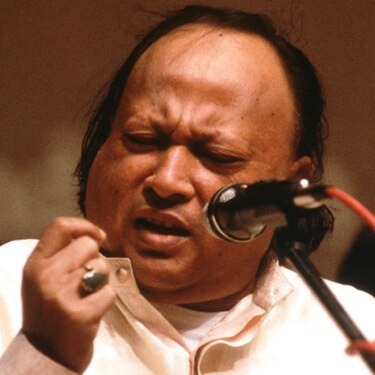Ustad Nusrat Fateh Ali Khan: A Timeless Legend on His Death Anniversary
By Amit Kumar

August 16 marks the death anniversary of Ustad Nusrat Fateh Ali Khan, one of the most celebrated
qawwali singers in the history of South Asia and the world. Born on October 13, 1948, in Lyallpur
(now Faisalabad), Pakistan, Nusrat hailed from a family with a 600-year-old musical tradition. He
inherited the rich legacy of qawwali from his father, Fateh Ali Khan, and his uncles, continuing the
devotional music form with unmatched passion and skill.
Known as the “Shahenshah-e-Qawwali” (King of Kings of Qawwali), Nusrat’s powerful voice and
extraordinary range enabled him to perform with astounding intensity for hours. His music
transcended borders and religious divides, touching millions of hearts worldwide. He popularized
qawwali beyond South Asia, bringing this deeply spiritual music to global audiences through
countless performances and collaborations.
Nusrat began performing publicly at the age of 15, quickly emerging as the lead singer of his family’s
qawwali troupe after his father’s death. His ability to blend classical forms with contemporary styles
elevated his status, leading to international acclaim. Over his career, he recorded over 125 albums
and performed in over 40 countries, making him an ambassador of Sufi music.
Tragically, Nusrat Fateh Ali Khan passed away at the young age of 48 due to a sudden cardiac arrest
on August 16, 1997, in London. Despite his premature death, his legacy continues through his
recordings and through his nephews, including the renowned Rahat Fateh Ali Khan, who carries
forward the family tradition.
On this day, music lovers around the world remember Nusrat not only for his extraordinary talent but
also for his unifying spirit that bridged cultures and hearts through the universal language of music.
His life remains a testament to the power of art to inspire, uplift, and connect souls beyond
boundaries.
